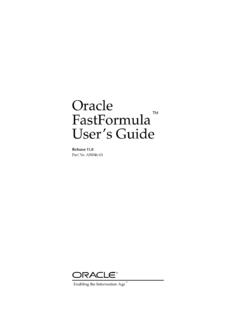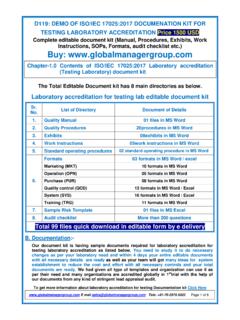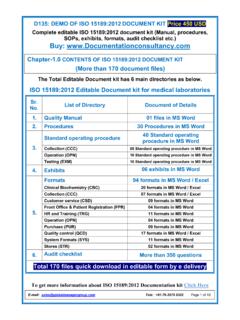Transcription of Audit Technique Guide – Social and Recreational Clubs – …
1 Audit Technique Guide Social and Recreational Clubs IRC Section 501(c)(7). Introduction This Audit Technique Guide includes specific information to identify and develop issues commonly encountered during the examination of an IRC Section 501(c)(7) organization. This Guide supplements the procedures in IRM , Exempt Organizations Examinations Procedures and isn't intended to restrict you in identifying issues or using examination techniques not included here. This Guide doesn't contain detailed technical information on IRC Section 501(c)(7). organizations. Review the technical information in IRM , Social and Recreational Clubs . IRC Section 501(c)(7) describes Social and Recreational Clubs exempt from federal income tax under IRC Section 501(a).
2 Generally, Social Clubs consist of membership organizations supported by dues, fees, charges or other funds paid by their members. Typical organizations that may qualify for exemption under IRC Section 501(c)(7) are: College fraternities and sororities Country Clubs Amateur hunting, fishing, tennis, swimming and other sport Clubs Hobby Clubs Ethnic Clubs Yacht Clubs Community Associations The objective of an examination of a Social or Recreational club is to determine whether the organization is organized and operating per the exempt purposes of IRC Section 501(c)(7). Determine the following: The organizational requirements of IRC Section 501(c)(7) have been met.
3 The members are bound together by a common objective directed toward pleasure, recreation or similar nonprofit purposes. The activities are in furtherance of pleasure, recreation or other similar nonprofit purposes. There is no inurement of income. All unrelated trade or business income has been properly reported on the Form 990-T, Exempt Organizations Business Income Tax Return. Organizational Requirements of a Social or Recreational club A Social club must be organized for pleasure, recreation and other similar nonprofitable purposes. A Social club is described in IRC Section 501(c)(7) if it is organized for pleasure, recreation and other similar nonprofitable purposes.
4 However, a club isn't exempt from taxation under IRC. Page 1 of 24. Section501(a) if the club has any written policy that discriminates based on race, color, or religion. See IRC Section501(i). The previous statement doesn't apply in the following circumstances: Auxiliaries of IRC Section 501(c)(8) fraternal beneficiary societies may limit their membership to the members of a particular religion under IRC Section 501(i)(1). A club may in good faith limits its membership to the members of a particular religion in order to further its teachings or principles, and not to exclude individuals of a particular race or color under IRC Section 501(i)(2).
5 A club 's governing instruments may limit its membership to individuals of a particular national origin without jeopardizing its exemption. A club may restrict its membership to a particular political party or to homeowners in a specific housing development. Note: Although membership may be restricted to a particular political party or to homeowners in a specific housing development, these organizations aren't permitted to also limit membership based on race, color, or religion. Auditing Organizational Requirements of a Social or Recreational club Review the following governing instruments including: o Articles of organization o Bylaws o Any policy statements Determine that: o The club is organized for pleasure, recreation and other similar nonprofit purposes.
6 O There are no activities expressly authorized that are beyond the scope of IRC Section 501(c)(7). o There are no written provisions limiting membership on the basis of race, color or religion (except as otherwise noted in IRC Section 501(i)). Note: The IRS doesn't require an organization to have an affirmative statement of nondiscrimination. Membership Requirements of a Social or Recreational club A Social or Recreational club must provide the opportunity for personal contact between its members and the members must be bound together by a common objective of pleasure, recreation, and other nonprofitable purposes. See Rev. Rul.
7 74-30, 1974-1 137. The common objective must be dedicated towards pleasure, recreation and other non- profitable purposes. See Chattanooga Auto. club v. Commissioner, 182 551, 554 (6th Cir. 1950) (interpreting section 101(9), the predecessor to section 501(c)(7)); see also Lake Petersburg Assoc. v. Commissioner, 33 259 (1974). Note: Members must share common interests or share goals justifying the organization's existence. Page 2 of 24. Auditing Membership Requirements of a Social or Recreational club When auditing membership requirements, determine any prerequisite conditions or limitations imposed on members, such as an interest in a particular hobby.
8 Examples of Social organizations that share a common goal or mutuality of interests could include flying and gardening Clubs . To Audit membership requirements: REVIEW TO DETERMINE. Bylaws, minutes of meetings, club handbooks,If members have the opportunity for brochures, and newsletters fellowship, commingling, or other personal contact. Commingling is present if things like meetings, Social gatherings, and Recreational facilities are available for the membership. Generally, the lack of commingling of members presents a red flag indicating that the basic purpose of the organization serves to provide personal services and goods in a manner similar to commercial enterprises.
9 Membership applications, club handbooks and Requirements and procedures for obtaining any brochures or other information provided membership. Determine the types of to prospective members memberships available and whether they include corporations. An automobile club whose principal activity is rendering automobile services to its members but has no significant Social activities doesn't qualify for exemption under IRC Section 501(c)(7). Rev. Rul. 69-635, 1969-2 126. Note: Rev. Rul. 69-635 hasn't been updated to reflect 94- 568, 1976-2 596. Likewise, a flying club which provides economical flying facilities for its members but has no organized Social and recreation program doesn't qualify for exemption under IRC Section 501(c)(7).
10 Rev. Rul. 70-32, 1970-1 132. Note: Rev. Rul. 70-32 hasn't been updated to reflect 94-568. A country club that issues corporate membership is dealing with the general public in the form of the corporations' employees. Accordingly, treat corporate memberships as gross receipts from a nonmember source. However, bona fide individual memberships that a corporation paid for are indistinguishable from other individual memberships. See Rev. Rul. 74-489, 1974-2 169. Note: Rev. Rul. 74-489 hasn't been updated for 94-568. A Social club doesn't jeopardize its exemption under IRC Section 501(c)(7) by admitting corporation sponsored individuals who have the same rights and privileges as regular individual members and who must seek a membership committee's approval.

















